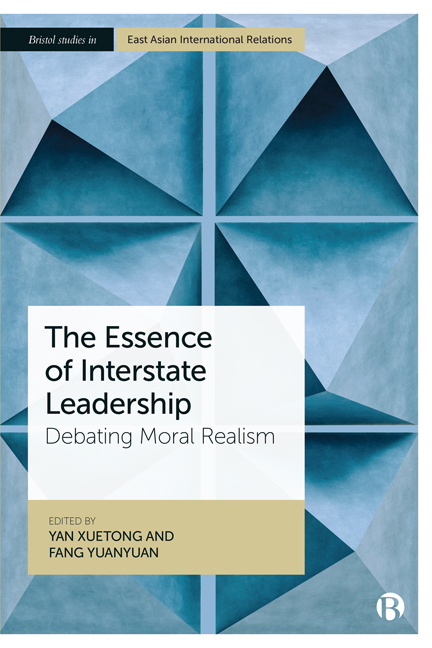Book contents
- Frontmatter
- Contents
- List of Abbreviations
- Notes on Contributors
- Preface
- 1 Interstate Leadership, Moral Realism, and their Critics
- 2 IR Moral Realism as a Universal Theory
- 3 Moral Realism as an Alternative Approach to the Agent-Structure Problem
- 4 Prospects, Promise, and Limitations of Moral Realism
- 5 Ideal Morality and Realist Interest of Moral Realism
- 6 The Conception of Morality in Moral Realism
- 7 Moral Realism and Hegemonic Transition
- 8 Innovation of Moral Realism and Dialogue with It
- 9 Moral Realism and Sino-American Relations
- 10 Moral Realism on Interstate Leadership in Response to Critics
- Appendix 1 Written Discussion between Rajesh Rajagopalan and Yan Xuetong
- Appendix 2 ‘Chinese School’ as an Inappropriate Title
- Selected Bibliography
- Index
2 - IR Moral Realism as a Universal Theory
Published online by Cambridge University Press: 18 January 2024
- Frontmatter
- Contents
- List of Abbreviations
- Notes on Contributors
- Preface
- 1 Interstate Leadership, Moral Realism, and their Critics
- 2 IR Moral Realism as a Universal Theory
- 3 Moral Realism as an Alternative Approach to the Agent-Structure Problem
- 4 Prospects, Promise, and Limitations of Moral Realism
- 5 Ideal Morality and Realist Interest of Moral Realism
- 6 The Conception of Morality in Moral Realism
- 7 Moral Realism and Hegemonic Transition
- 8 Innovation of Moral Realism and Dialogue with It
- 9 Moral Realism and Sino-American Relations
- 10 Moral Realism on Interstate Leadership in Response to Critics
- Appendix 1 Written Discussion between Rajesh Rajagopalan and Yan Xuetong
- Appendix 2 ‘Chinese School’ as an Inappropriate Title
- Selected Bibliography
- Index
Summary
A decade or so has passed since Nele Noesselt published ‘Is There a “Chinese School” of IR?’ in 2012. Now, many international relations (IR) scholars regard IR moral realism as one of the major theories affiliated with the ‘Chinese School’ and view it as a theory that shares the same defects of that school. This is a common misunderstanding about IR moral realism. Thus, this chapter will address these criticisms and illustrate that they are not applicable to moral realism.
Disagreement on the issue of ‘Chinese school’
In 2004, Chinese IR scholars held a conference on ‘Constructing Chinese Theories, Establishing Chinese School’. Faced with the new upsurge of constructing Chinese IR theories, I took the opposite stance to that of most Chinese IR scholars. It may be because my thinking was so different on this issue, that Shijie Jinji Yu Zhengahi (World Economics and Politics) invited me in 2006 to write an essay to give my opinion. In the opening paragraph I argue that ‘IR theories themselves do not have national identities, thus it is impossible to construct Chinese IR theories’. From then on, Qin Yaqing, the leading advocate for the ‘Chinese School’, and I have continuously debated on this issue.
At the moment, Qin's position has been widely accepted by both Chinese and international adherents, while mine has received little support. The term ‘Chinese School’ or ‘Chinese IR theories (IRT)’ have increasingly appeared in papers, dissertations, and books. Nevertheless, this popularity does not make it reasonable to categorize moral realism as a theory of ‘Chinese School’. Although moral realism, relational theory, and the tianxia system are often regarded as ‘[t] he “big three” of Chinese IR thinking’, these three theories are different in terms of ontology, epistemology, and methodology.6 As Yongjin Zhang noted, ‘[T]here is significant epistemological and methodological diversity within the Chinese School, even though the notion of a singular “Chinese School” seems to suggest otherwise’. Furthermore, scholars such as Peter J. Katzenstein have pointed out that ‘[s]ome prominent scholars like Qin are committed to building a Chinese School. Others like Yan regard this as an unnecessary, even harmful exercise. These moves have been widely debated in and across other national schools of IR’.
- Type
- Chapter
- Information
- The Essence of Interstate LeadershipDebating Moral Realism, pp. 16 - 30Publisher: Bristol University PressPrint publication year: 2023



